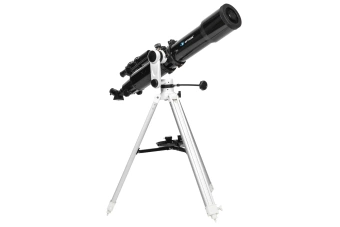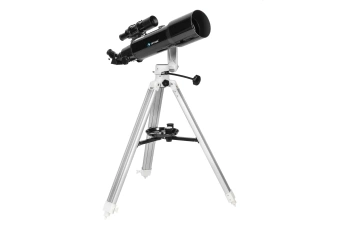Telescopes
Astronomy telescopes are the most important devices for any star and planet lover to observe the night sky. Thanks to them, we can look at celestial bodies located millions of kilometers away from us.
The first optical instruments were developed as early as the 17th century and very similar, although modernized, designs are still in use today. They are not intended only for professional researchers. There are a lot of simple to use telescopes that are suitable and are suitable for any beginner, adult astronomer, as well as a child.
Who invented the astronomical telescope?
The invention of the first telescope, or rather spyglass, is attributed to Jan Lippershey from the Netherlands.This took place in 1608, and a year later Galileo presented his improved telescope model. He is often considered the main inventor, as he made many important discoveries using it. The astronomical telescope was yet again improved by Newton who used speculums instead of lenses in it. And here we come to another important point, which is its construction.
Learn about the types of telescopes
An optical telescope allows you to magnify a distant object so you can get a better look at it. It picks up diffused light, which also makes the surveyed body brighter. We can enjoy observing the sky and stars that are millions of kilometers away from us.
There are two main types of telescopes, which differ in the optical elements used. A lenticular telescope consists of an objective containing lenses, while a reflecting telescope is built of an eyepiece and a mirror. The optical element determines what kind of image an astronomy telescope gives: straight or inverted, as well as which heavenly bodies it is best suited for observing.
Who is the lenticular telescope for?
In a lenticular telescope, rays of light are captured by an objective lens and then focused by a lens. This type of device gives a magnified and straight image, so it can also be used for nature observation. In addition, it will be great for watching bright objects like planets and double stars, or in admiring the Moon.
Reflecting telescope - if you want to see more
In reflecting telescopes, mirrors are responsible for focusing the light. They give lower contrast, so they work well for observing darker objects: nebulae, galaxies and clusters. The image seen is inverted, and this is rather not favourable for observing terrestrial phenomena.
Which telescope to buy?
Telescopes available today can be used by anyone, including beginners who are just starting out in astronomy. It is then worth choosing a simple-to-use observational telescope, in which nothing needs to be set up, but is immediately ready for use. Of course, even the simplest devices vary in quality and parameters, so they will give more or less magnification, sharpness and image detail.
The most important parameters
Even if you are choosing your first device for viewing the sky, you still need to pay attention to its various components. Just because you are starting out does not mean that you will be satisfied with every model. It's easy to get discouraged if you buy the wrong device. At the very beginning, you may also need help in choosing, so it is worth seeking the opinion of more experienced sky watchers.
- the diameter and focal of the lens or mirror - the diameter of the optical elements is a very important parameter, since the ability of the equipment to catch light depends on it. The larger the diameter, the more rays enter the camera. Observed objects are brighter and clearer. The focal affects the magnification of the object, and also determines the length between the main point of the optical system and its focus.
- eyepiece focal length - determines the magnification and our field of view, since it is through the eyepiece that we look. With a larger focal length, the object is magnified more and we have a better view.
- image magnification - the focal length of the lens divided by the focal length in the eyepiece gives us the magnification of the equipment. These are interchangeable elements, so this parameter can vary. It is also not the most important, since atmospheric factors also affect the magnification. Too much magnification can also negatively affect the quality of the image.
Very important thing is the diameter of optical elements. The larger it is, the better the views are, but also along with the diameter the prices of the devices increase. The optimum diameter to satisfy the amateur and, incidentally, is also affordable is: 8-11 cm for the lens and 11 -15 cm for the mirror. Size and weight are also important. A device that is too large is difficult to carry, yet for observing purposes one usually has to move around. Compact telescopes are certainly more convenient to transport.
Extra astronomy telescope accessories
Additional accessories are also very useful: a finder, a stable tripod, eyepieces with different parameters, filters or cameras. They are able to enhance the use of the equipment and improve the quality of the image.
Telescope - price and models
The optical tools available today are successfully used by scientists, as well as by individuals. They differ in construction and advancement. Usually, as knowledge and experience grows, so does the ability to use optical equipment, so even beginners don't stop at buying one tool. The prices of telescopes also increase with their quality and advancement, but nowadays you can also buy on convenient installments.
Astronomical telescopes can also be a great gift idea, for any younger or older sky lover. Our store has a wide range from such popular manufacturers as Levenhuk and Opticon, so you will definiately be able to choose the perfect device!

- Brand: OPT
- eyeglass: 1,25"
- focal: 900
- lens diameter [mm]: 102
- magnification: 270x
Opticon lenticular telescope 102F900AZ16

- Brand: OPT
- eyeglass: 1,25"
- focal: 600
- lens diameter [mm]: 102
- magnification: 180x
Opticon lenticular telescope 102F600AZ16

- Brand: OPT
- eyeglass: 1,25"
- focal: 650
- lens diameter [mm]: 90
- magnification: 300 x
Lenticular telescope Opticon 90F650AZ1

- Brand: OPT
- eyeglass: 1,25"
- focal: 500
- lens diameter [mm]: 80
- magnification: x249
Opticon lenticular telescope 80F500AZ1

- Brand: OPT
- eyeglass: 1,25"
- focal: 650
- lens diameter [mm]: 90
- magnification: 195x
Opticon lenticular telescope D90F650

- Brand: OPT
- eyeglass: 1,25"
- focal: 500
- lens diameter [mm]: 80
- magnification: 150 x
Lenticular telescope Opticon D80F500

- Brand: OPT
- eyeglass: 1,25"
- focal: 1300
- lens diameter [mm]: 160
- magnification: 390 x
OPTICON Orbiter Telescope

- Brand: OPT
- eyeglass: 1,25"
- focal: 1100
- magnification: 330 x
OPTICON Stargaze Telescope

- Brand: OPT
- eyeglass: 1,25"
- focal: 600
- lens diameter [mm]: 102
- magnification: 92x
Telescope OPTICON Star Painter 102F600

- Brand: OPT
- eyeglass: 1,25"
- focal: 700
- lens diameter [mm]: 127
- magnification: 107x
Telescope OPTICON Space Traveler 127F700

- Brand: OPT
- eyeglass: 1,25"
- focal: 700
- lens diameter [mm]: 76
- magnification: 525 x
OPTICON Pulsar 76F700 Telescope

- Brand: OPT
- eyeglass: 1,25"
- focal: 300
- lens diameter [mm]: 76
- magnification: 150 x
Telescope OPTICON StarQuest 76F300DOB

- Brand: OPT
- eyeglass: 1,25"
- focal: 900
- lens diameter [mm]: 114
- magnification: 450 x
Telescope OPTICON Discovery 114F900AZ

- Brand: OPT
- eyeglass: 1,25"
- focal: 1000
- magnification: 200 x
Telescope OPTICON Universe 114F1000EQ

- Optical system: Reflector (mirror telescope) Magnification: 430 x Diameter [mm]: 150 mm Focal length [mm]: 1400 mm Focal ration: f/9,33 Resolving power: 0,92" Limiting magnitude: 13,2 mag Focuser: 1,25" Mount: Parallactic
Telescope OPTICON Galaxy 150F1400EQ

- Brand: OPT
- eyeglass: 1,25"
- focal: 650
- lens diameter [mm]: 90
- magnification: 195x
Opticon 90F650AZ16 lenticular telescope

- Brand: OPT
- eyeglass: 1,25"
- focal: 500
- lens diameter [mm]: 70
- magnification: x249
Opticon lenticular telescope 70F500AZ1

- Brand: OUTLET
- eyeglass: 1,25"
- focal: 800
- lens diameter [mm]: 203
- magnification: 246 x
Opticon SkyChart 203F800EQ-4 telescope (OUTLET)

- Brand: OUTLET
- eyeglass: 1,25"
- focal: 1400
- magnification: 430 x
OPTICON Galaxy 150F1400EQ telescope (OUTLET)

- Brand: OUTLET
- eyeglass: 1,25"
- focal: 800
- lens diameter [mm]: 203
- magnification: 246 x
Opticon SkyChart 203F800EQ-4 telescope (OUTLET)

- Brand: OUTLET
- eyeglass: 1,25"
- focal: 1300
- lens diameter [mm]: 160
- magnification: 390 x
OPTICON Orbiter telescope (OUTLET)

- Brand: OUTLET
- eyeglass: 1,25"
- focal: 900
- lens diameter [mm]: 102
- magnification: 138x
OPTICON Supernova 102F900 telescope (OUTLET)

- Brand: OUTLET
- eyeglass: 1,25"
- focal: 800
- lens diameter [mm]: 203
- magnification: 246 x
Opticon SkyChart 203F800EQ-4 telescope (OUTLET)

- Brand: OUTLET
- eyeglass: 1,25"
- focal: 900
- lens diameter [mm]: 102
- magnification: 138x
OPTICON Supernova 102F900 telescope (OUTLET)

- Brand: OUTLET
- eyeglass: 1,25"
- focal: 600
- lens diameter [mm]: 102
- magnification: 92x
OPTICON Star Painter 102F600 telescope (OUTLET)
- 1
- 2


